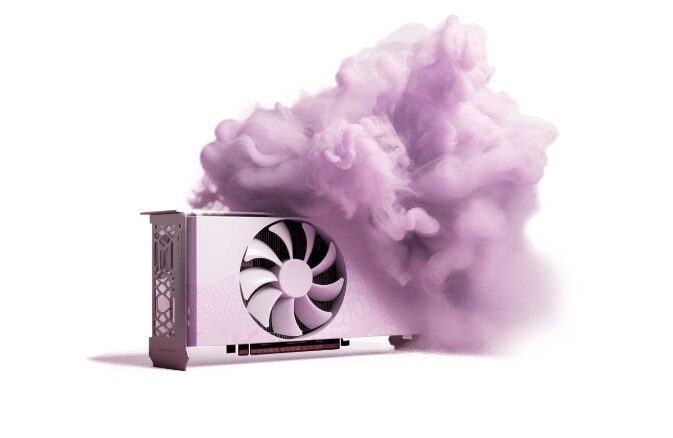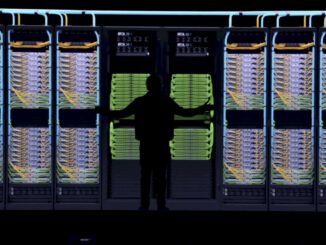
Riding high on the AI hype cycle, Lambda – formerly known as Lambda Labs and well known to readers of The Next Platform – has received a $320 million cash infusion to expand its GPU cloud to support training clusters spanning thousands of Nvidia’s top specced accelerators.
This will include deploying “tens of thousands” of Nvidia GPUs, including the existing H100 accelerators and impending G200 heavy weight GPU accelerators as well as the hybrid GH200 superchips. The G200s are important because they push UBM3e capacity up to 141 GB and aggregate bandwidth per device up to 4.8 TB/sec.
Alongside the accelerators, the funding will also support the deployment of faster Quantum-2 InfiniBand networking. The latest of these switches are capable of driving up to 400 Gb/sec of bandwidth to each port.
Lambda hasn’t said exactly how many accelerators the Series C funding round will afford them, or how much money it already has in the bank to invest in GPUs. However we expect Lambda should be able to acquire somewhere around 10,000 accelerators within that $320 million budget and leave a little left over for networking and other supporting infrastructure. With more aggressive discounting from Nvidia for the GPUs, that will leave more money for networking and storage to support the GPU systems.
Founded in 2012, Lambda has been working with GPU systems for a while now. Back in 2017, it started pedaling its AI wars to researchers exploring then-new transformer models, of which the large language models that drive chatty bots are but one example. Since then, Lambda’s offerings have since expanded to include co-location services for dense deployments of power and thermally demanding systems, in addition to reselling Nvidia’s DGX SuperPODs.
Lambda’s foray into cloud computing came around 2018, and that cloud, which sat beside a pretty healthy systems business, helped the company to pull in millions in funding to support its expansion. In 2021, the company nabbed $15 million in Series A capital alongside $9.5 million in debt financing. Two years later, it raked in another $44 million from investors. Less than a year later, investors are already lining up to dump even more cash into the company with this latest Series C round, led by the US Innovative Technology Fund (USIT), bringing its total raised to $432 million. New investors B Capital, SK Telecom, and T. Rowe Price Associates kicked in some of the Series C dough, and existing investors Crescent Cove, Mercato Partners, 1517 Fund, Bloomberg Beta, and Gradient Ventures also were part of the Series C round. With this raise, Lambda has a $1.5 billion valuation. It is interesting to note that Nvidia is not an investor, as Nvidia was with CoreWeave.
Which brings up another point. Lambda is far from the only company that has found success in this arena. Demand for GPUs capable of training large language models spanning hundreds of billions of parameters has driven considerable investment in these GPU bit barns.
A few months back we took a look at CoreWeave, which is deploying 22,000 H100 GPU accelerators to train the Inflection-2 LLM. We’ve seen other outfits pop up in recent months, like Voltage Park, which claims it has obtained 24,000 H100s it now plans to lease out at cut-rate prices. Even Cerebras Systems is building an AI compute cloud around its waferscale accelerators with the help of the United Arab Emirates’ G42, which is expected to cost $900 million to complete.
The success of these GPU clouds is hardly surprising considering just how expensive these systems are to build and maintain. If you’re only training your large language model once, it’s likely far cheaper to rent the 1,000-plus GPUs you need to do it than to buy, house, and maintain them.
This is really where companies like Lambda and CoreWeave have staked their claim, boasting GPU pricing as low as $2.23 per GPU per hour. Of course, actually getting those prices usually involves committing to lengthy reservations ranging from one to three years.
But considering that reserving Amazon Web Service’s P5 instances for three years will run you about $43.16 an hour, or about $5.39 per GPU per hour, that’s still a considerable savings, especially if you don’t have to worry about getting your hands on enough GPUs to get the job done.





Super job Lambda Labs! Especially as this comes with the filling of 39 positions (jobs, jobs, jobs!), including HPC, cloud, and IT enineers, and plenty more, mostly in the US, but a couple also in Canada and the Philippines (linked under “careers” at the bottom of their web page). It’s great to see the economy working this way, as it should!
Very nice! I’ve used their GPUs off and on from about their start. Lambda has always been a pleasure to work with.
Rent-a-GPU(c). mb